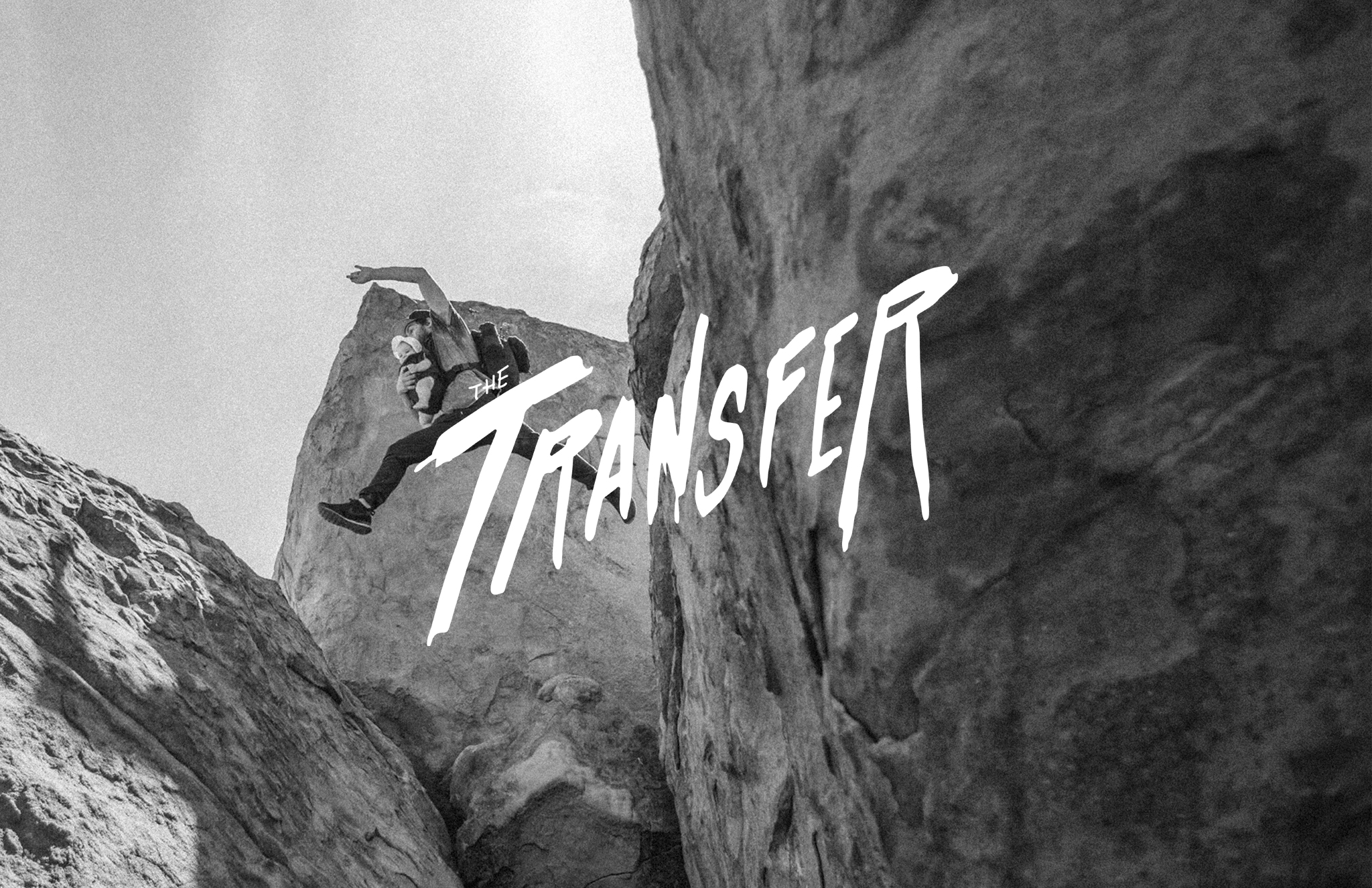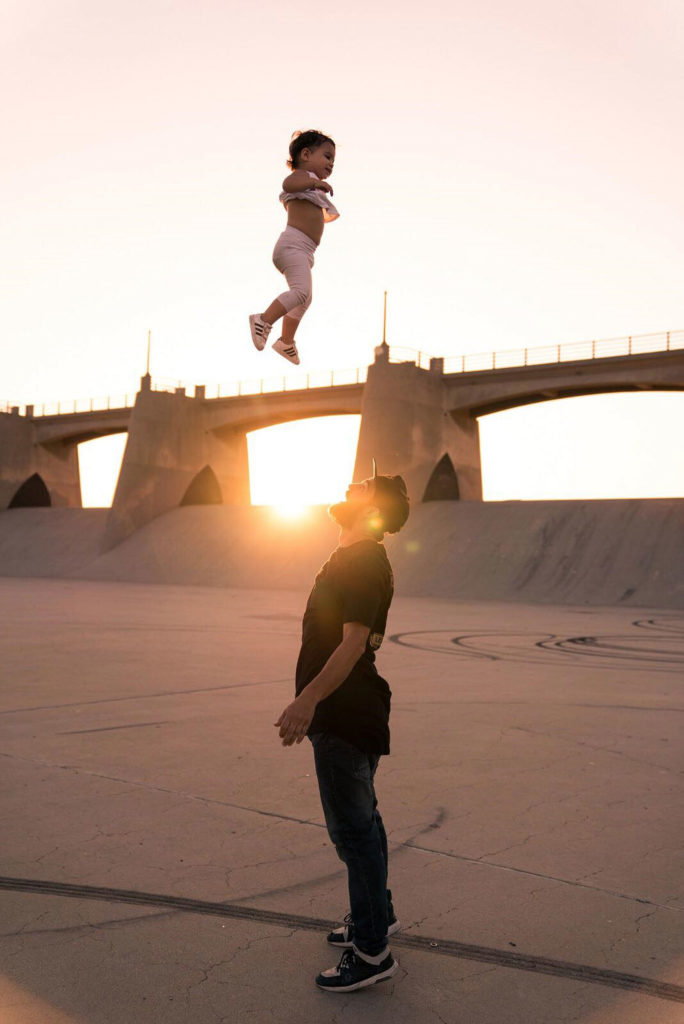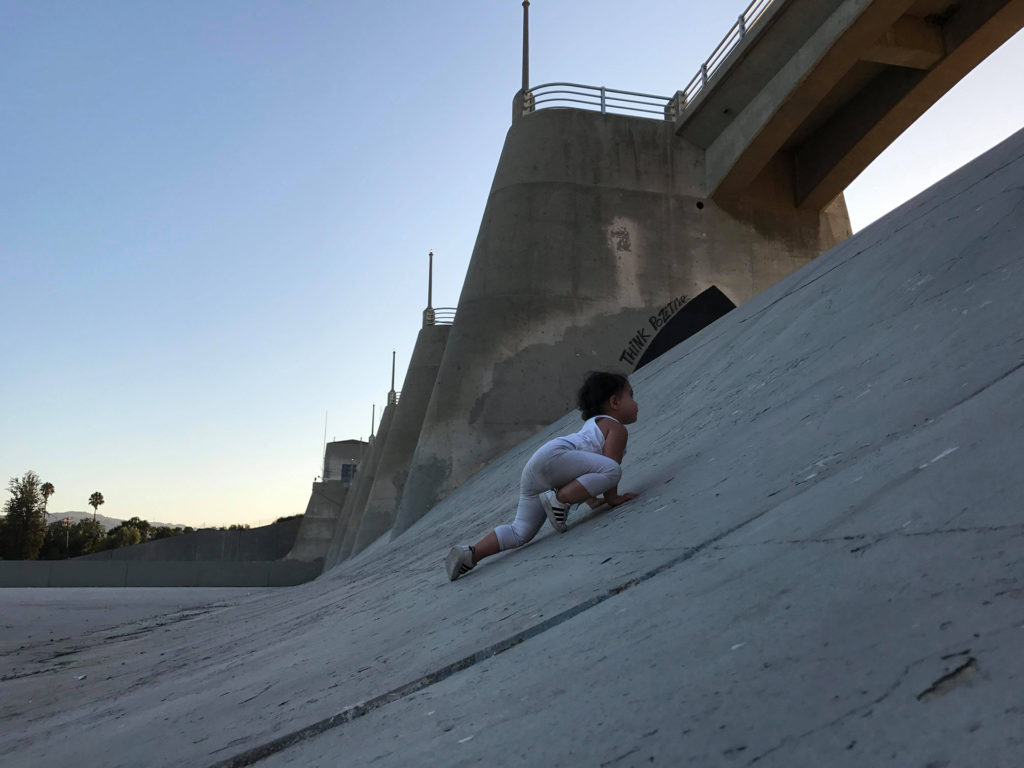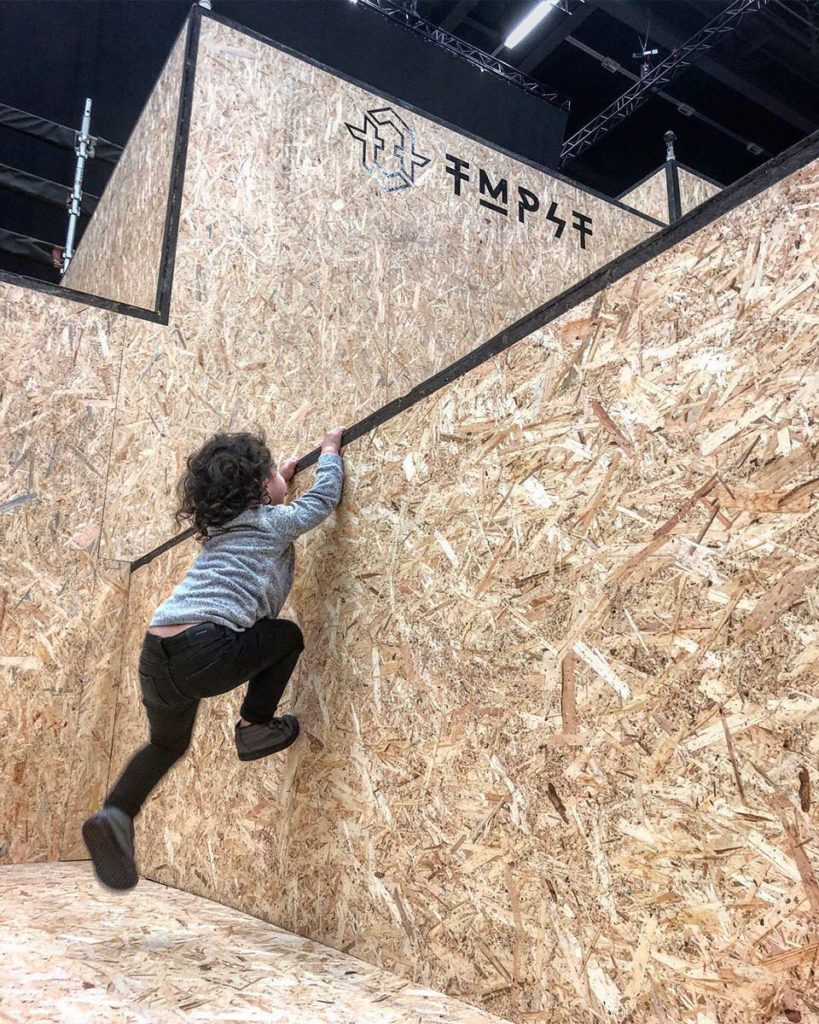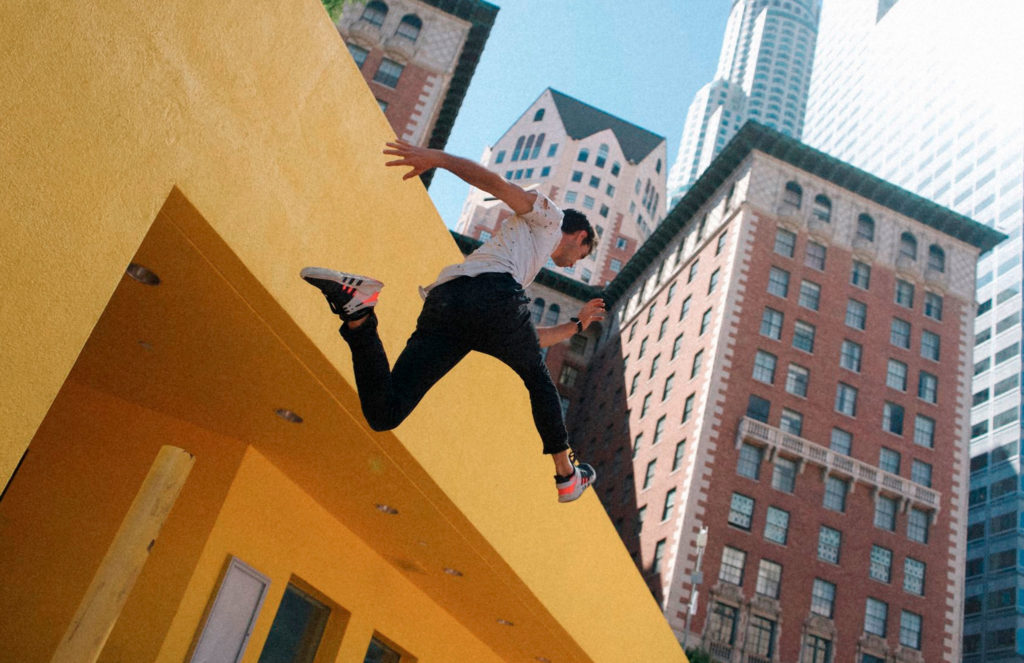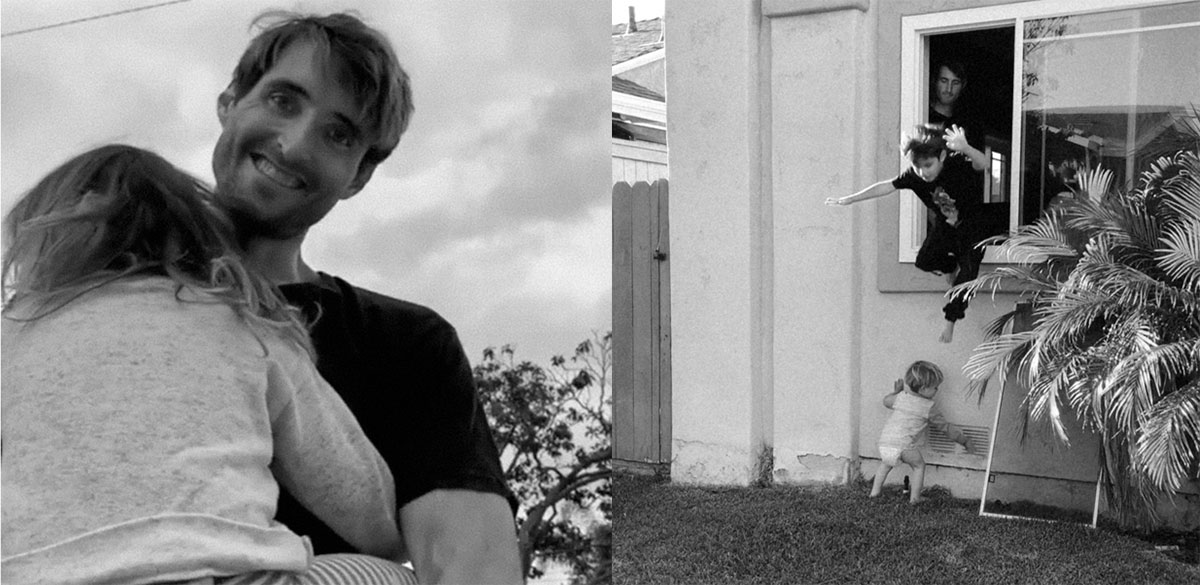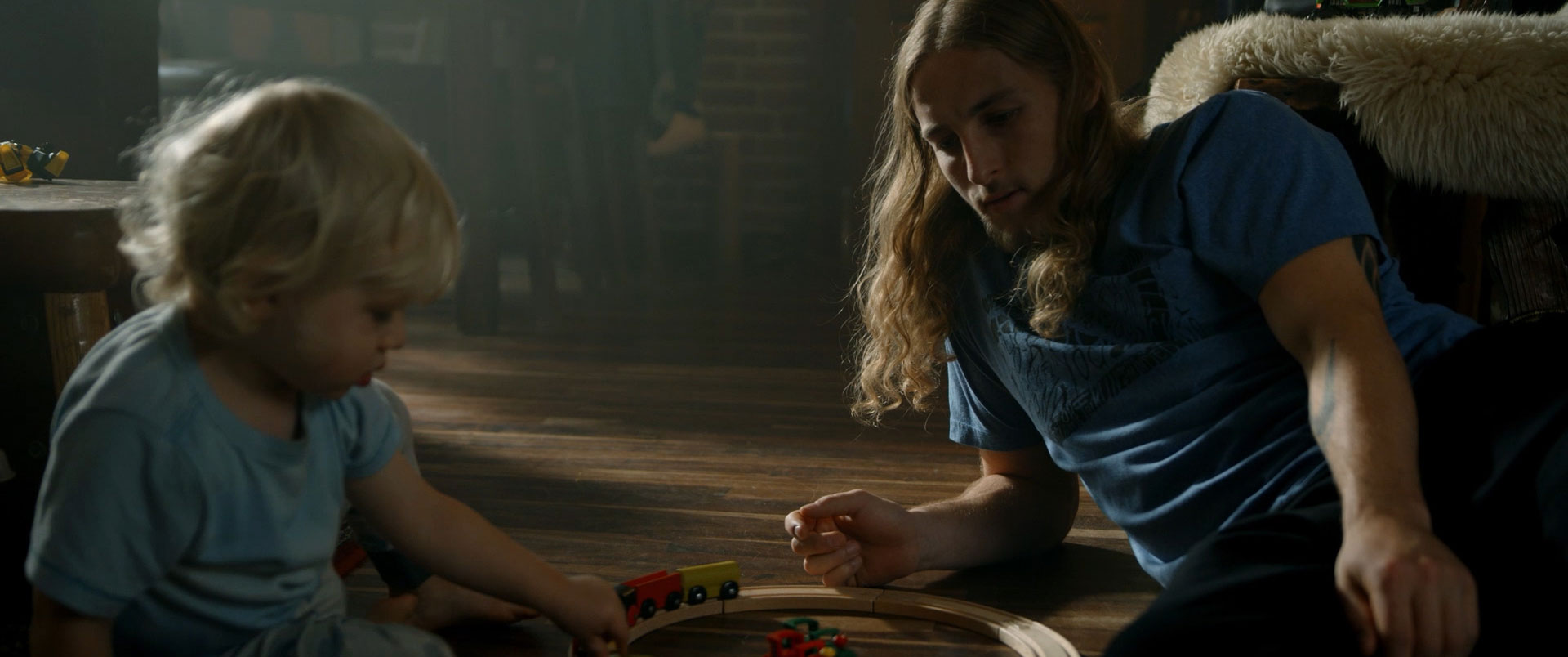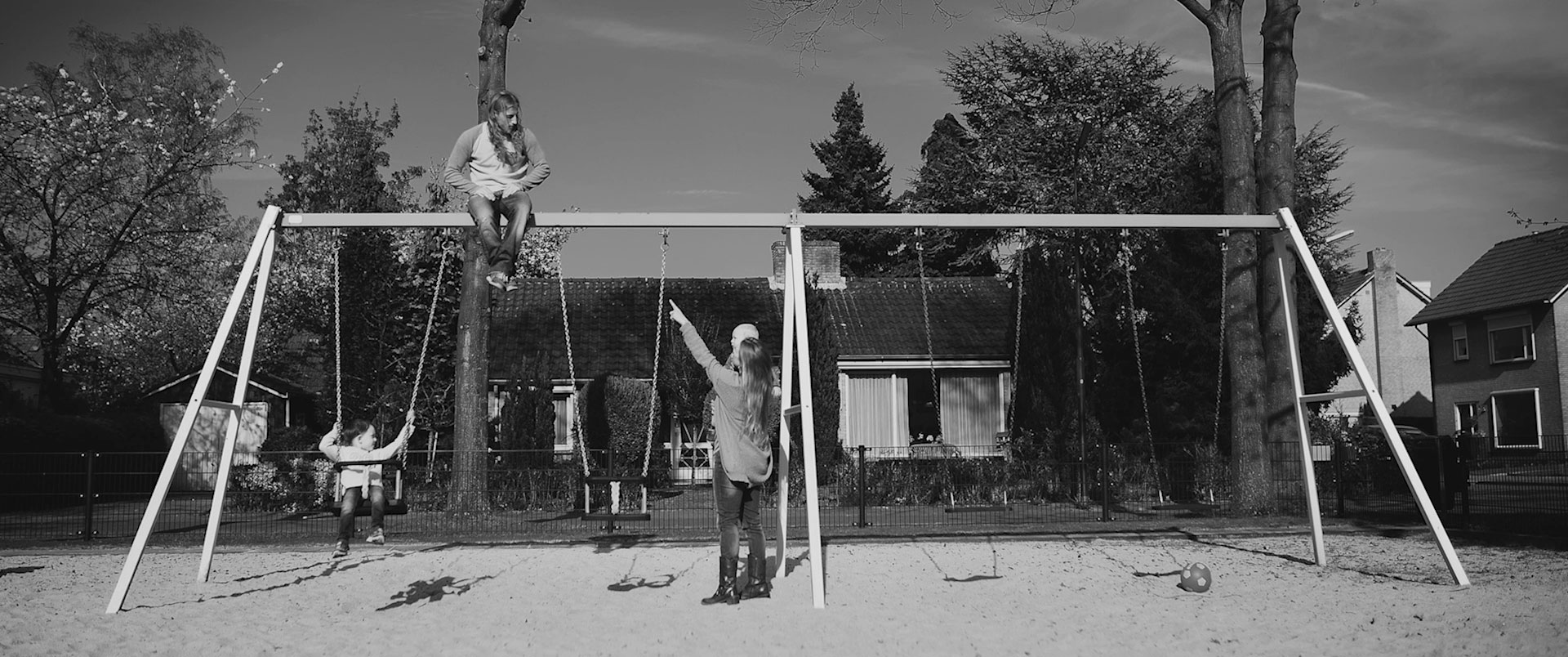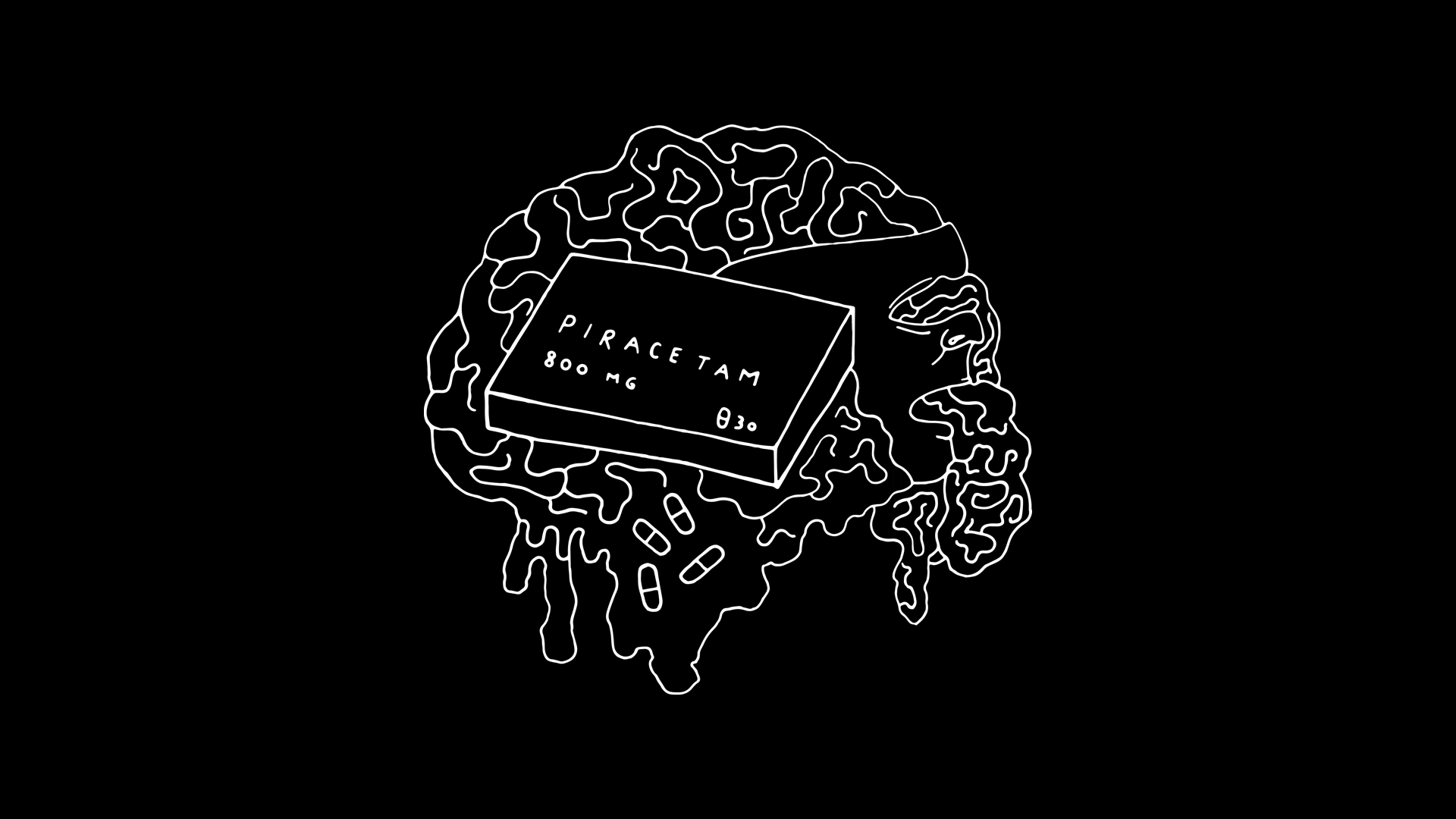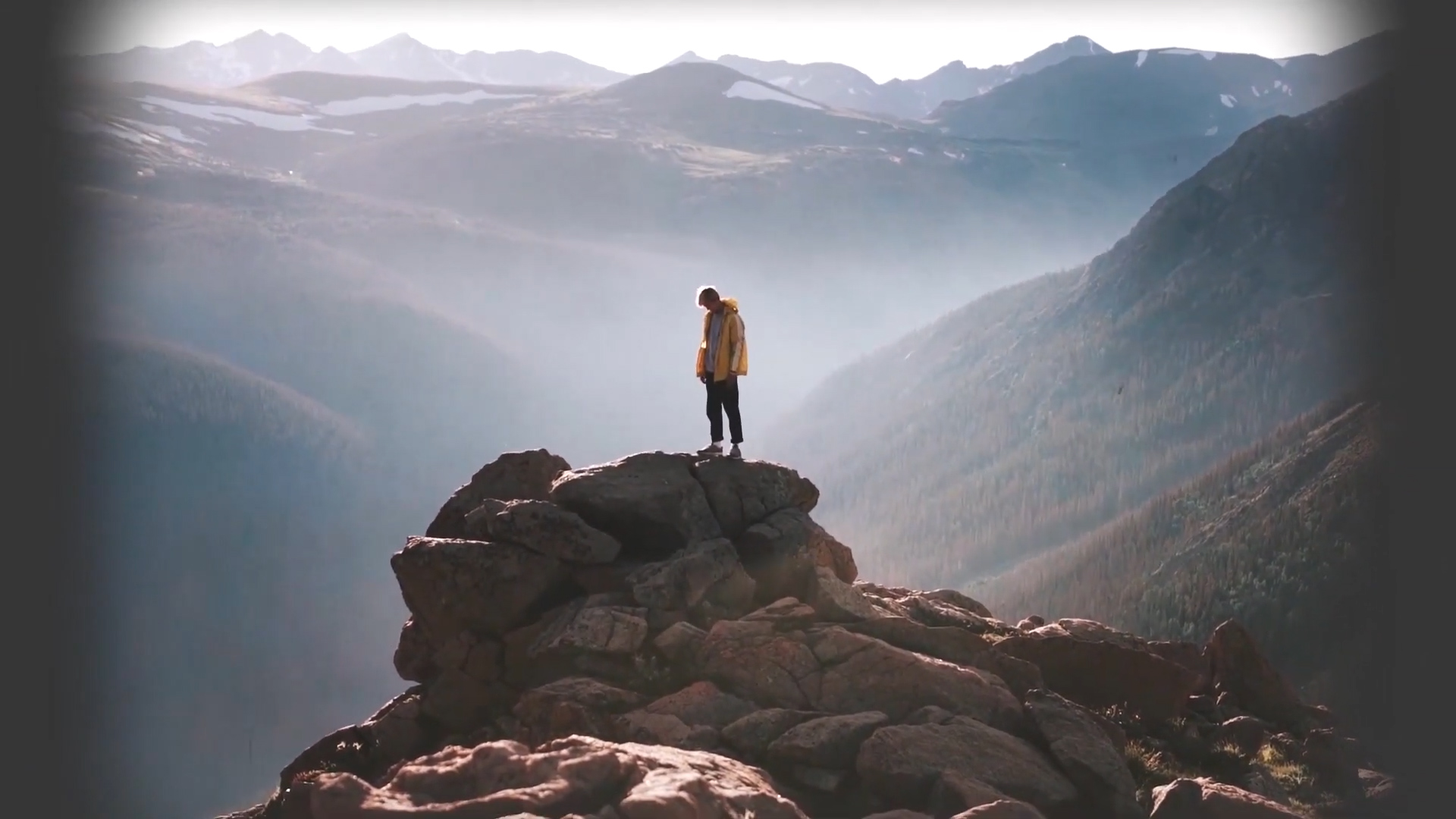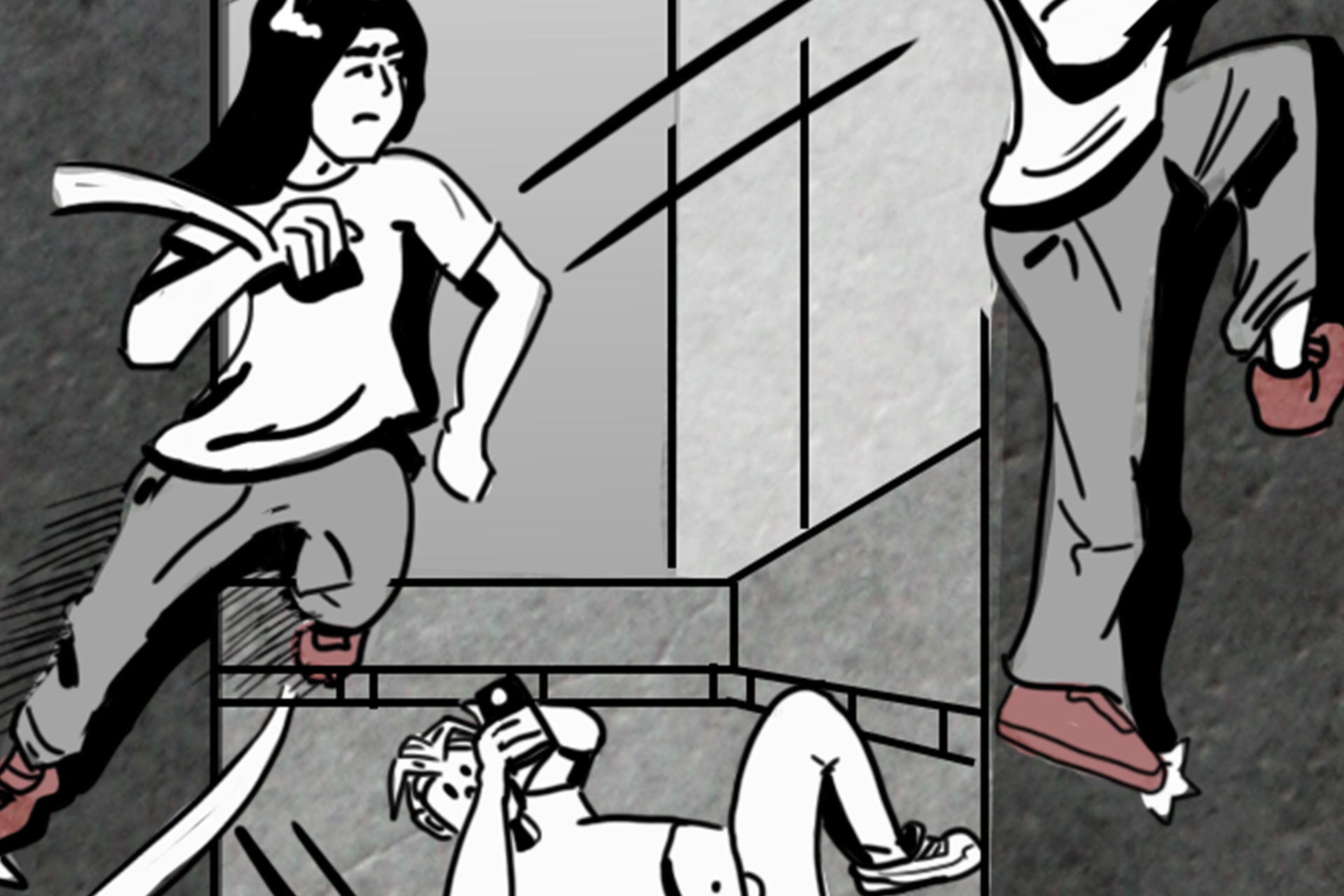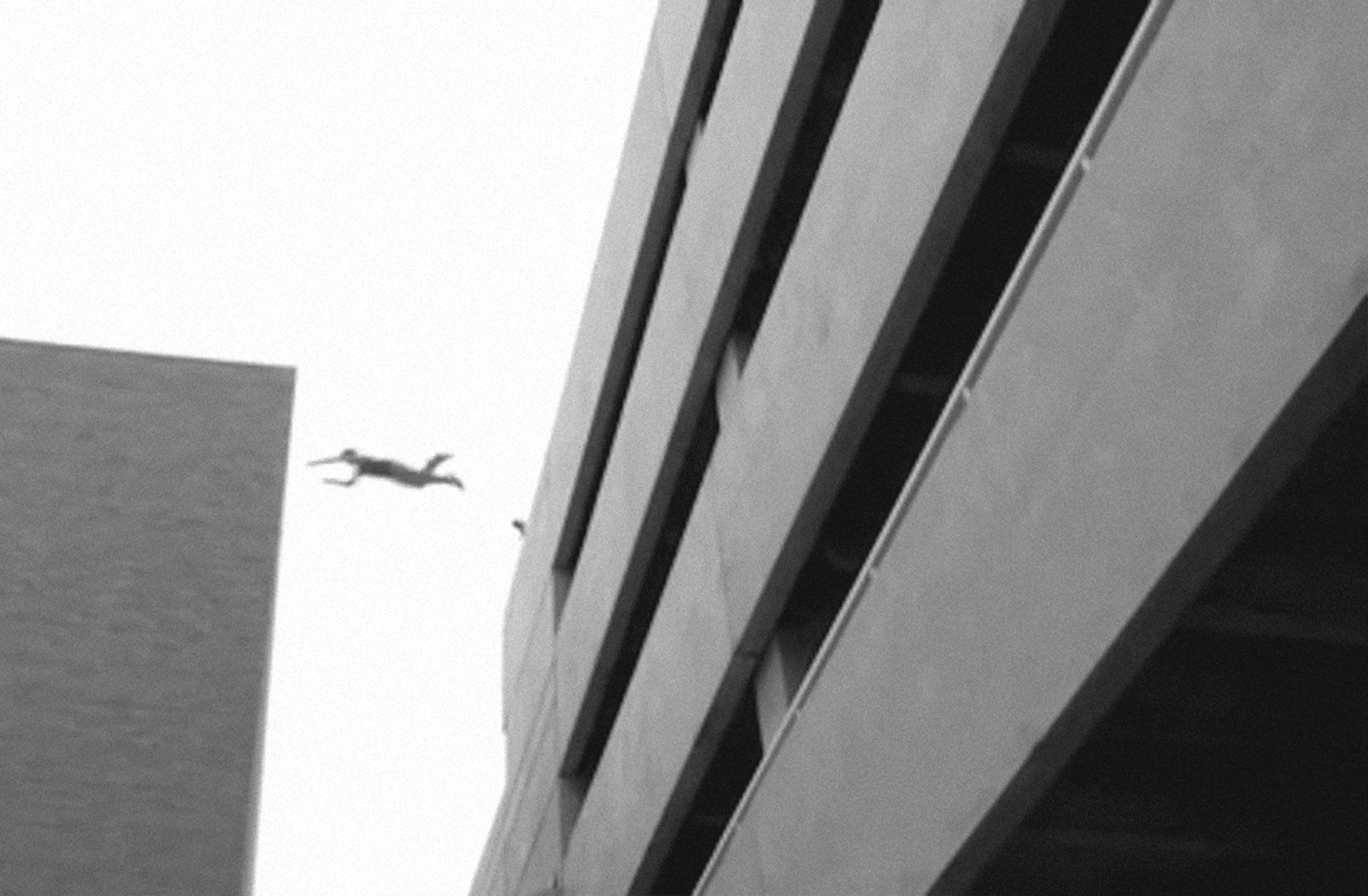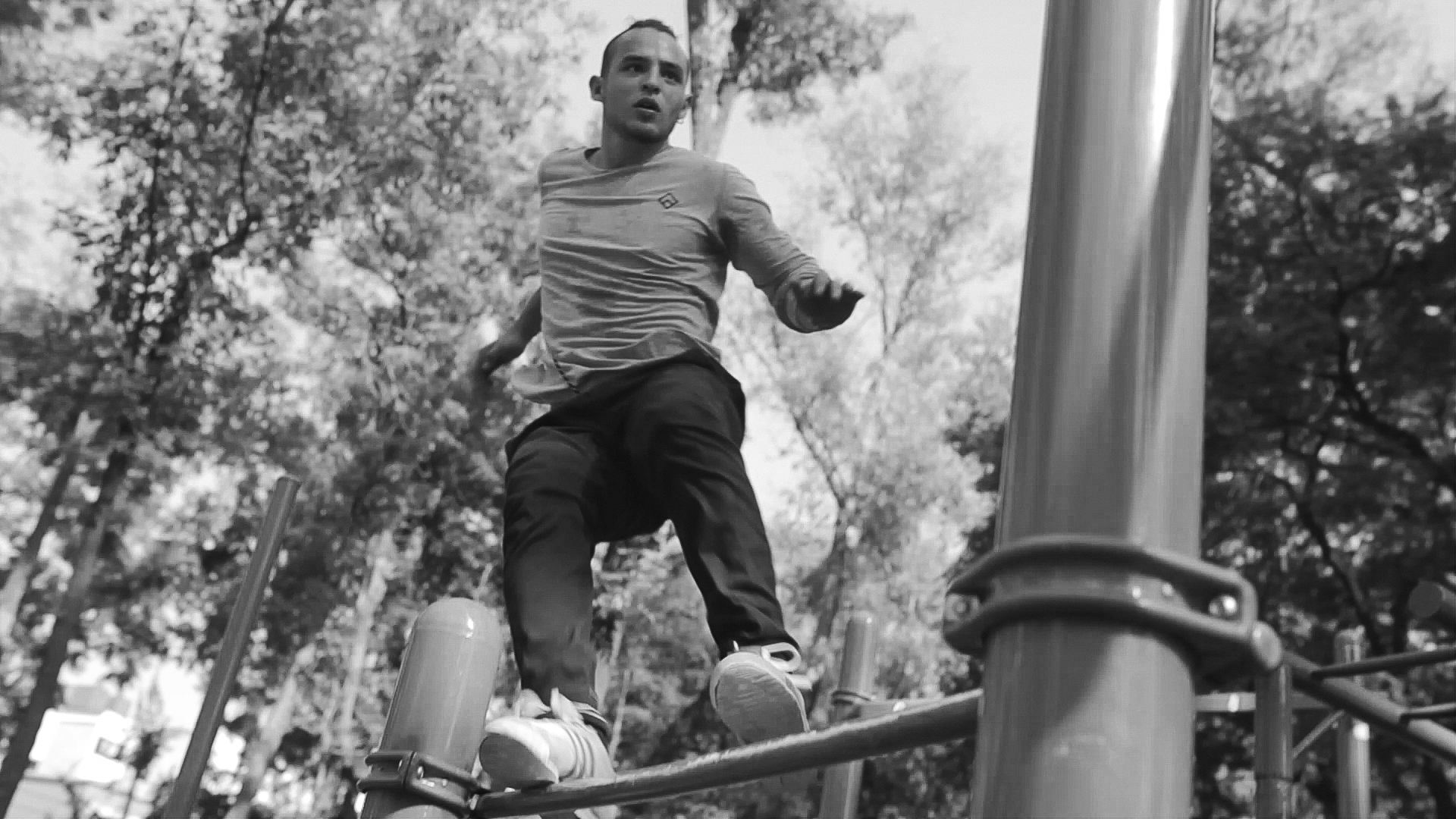For many, parkour is both a taste of freedom and an act of rebellion – a way to break away from the societal mold and continue playing when the rest of the world has told us to stop. “Grow up, ” they say, “Things must now happen this way. ” Parkour is our way of saying. “No, I’ll keep playing. Thank you,” and a way of keeping the inner child alive. However, what happens when we have children of our own?
Does becoming a parent change parkour for us, and how do the things we have learned through our practice affect our parenting? After all, the act of parenting is a seemingly never-ending obstacle course, and ultimately, isn’t it those challenges for which parkour prepares us?
Gabriel Nunez
I’ve only been doing it for four years, but so far, being a parent is amazing! It’s both the most difficult thing I’ve ever done and the most rewarding. It’s like a combination of revenge for all the shit you did as a kid, and a reward for all the good things you did. Honestly, it’s just crazy to think that I am responsible for setting a little human up to be able to handle herself in this big, wild world!
I feel my situation may be a bit unique compared to other parents who are still training. For me, I was already focused much more on running Tempest than I was training, so you have to learn to use your time much more wisely! For instance, instead of training for hours and hours at a time, you really have to consolidate and create a more focused style of training so you can accomplish the same amount of progression. All that said, I’m kinda in chill mode, and I train for fun without pushing myself much as an athlete anymore. Aside from that, I just play ball every day to keep the body in shape and feed my competitive side.
Parkour has taught me so much about my own emotional reactions to difficult situations, so I think I deal with the trickier side of parenting fairly well and not with emotional overreactions. Any parent will tell you that’s one of the harder things to master. I also pride myself on being good at finding solutions and dealing with failure in a way that doesn’t impact my ability to continue improving or growing. That heavily translates into how I raise my daughter. I constantly put her in challenging predicaments that she can fail at, and then subsequently figure out a way to succeed or overcome. That said, I don’t think parkour is specifically more beneficial to becoming a good parent than any other sport. I think team sports have also taught me a ton when it comes to my ability to work with people, which translates into my ability to be a good teammate to my partner and my child in the family setting.
Aside from the fact that she’s loving classes at our academies and always trying ridiculous challenges with me where ever we go, parkour will be both directly and indirectly a very large part of my child’s life. Most of her friends and influences are the badass humans from Tempest that we’re lucky enough to have in our circle. On top of having a great traditional family, my daughter is being raised amongst pro athletes, incredible coaches, great members of our staff, and a handful of stuntmen and women that I work with in the film industry. We literally keep her surrounded by greatness. Not because we have any specific ambitions for her, but because we truly believe great vision comes from surrounding yourself with others who have it. My daughter, Naya, is four now, and she’s been to Santorini for Art of Motion, to Sweden for Airwipp Challenge, and to pretty much every Tempest event we’ve had. We do that because we want her exposed to a community of passionate individuals who are pushing to make this world we live in better in some way, shape, or form. Since my upbringing was a bit different, I am excited to see what effect these influences have on her as she grows.
Paul Darnell
Being a parent is like running in place on ice for 24 hours while holding a 55-pound bag of diamonds and trying to drink a cup of coffee. It’s pretty much that easy.
The life of a freerunner is very spontaneous. Training sessions usually occur within one hour when you decide to train. You can just get up and go. Being a parent makes you work on time management. I definitely don’t train as much as I used to, but when I do train, it is more focused because I know I have limited time. I’m much more efficient with my time. My dedicated training time usually occurs when the kids are in school, and I tend to focus on learning new skills or training in areas I wouldn’t feel comfortable bringing my kids. When I’m home with the kids, training becomes a little harder, but I use the time with them to just play and build obstacle courses and show them a little bit of parkour.
I have learned that parkour truly is innate. Kids just want to run and jump and climb. The childlike nature of parkour is what drew me to it; discovering what our bodies are capable of is something we all explore. I see my kids finding new things they can physically do every day, and they are always pushing it. We all start off doing parkour.
Parkour has been a huge part of my life, I’ve pretty much based my life around it. From looking for the quickest route when traveling somewhere, to eating the most efficient food for my body. The lessons I’ve learned from parkour into parenting is “be strong to be useful.” What I mean by that is I try to be involved as much as I can with them. To play with them and be a source of knowledge, inspiration, and protection. I want to be someone my children look up to, enjoy playing with, and learn from.
Parkour is already a part of their lives. I’m slowing turning our house into a parkour playground. We have a bar setup in the backyard with an AirTrack, mini-tramp, and mats. Inside our home, we created a playroom decked out with a gymnastics spring floor, spotting blocks, mats, swings, and ropes to climb. They might not even realize it yet, but they are fully immersed in a parkour environment. My wife and I encourage them to play and move their bodies. She and I love to train, and we both hope that by creating an environment that is fun to play in, they will carry a mentality that movement is fun, strength is beautiful, and that you don’t have to stop playing when you grow up.
Bart van der Linden
The first year is tough because:
1. You have never gone through life with so little sleep before.
2. You constantly find yourself in situations you’ve never even imagined were possible, with zero preparation.
3. Besides parkour and your girlfriend, there now is a third love in your life that deserves all your love, time, and dedication.
On the plus side of things, I now have a training buddy for life, I am somebody’s superhero, and I get to learn a lot about myself and life. But what really makes it special is the mystical soul connection you develop with your child. I feel connected on such a deep level that is so genuine and selfless, it’s beautiful. I notice it most with things like learning how to ride a bike or climbing to the top of the playground all by himself. To witness these first victories in his little life gets me so excited and so proud. It’s awesome, really. If you remember how happy you felt when you landed your first flip outside (for me, it was a big deal), this is the kind of feeling that comes up in me even though he is the one that just achieved something.
Being a parent has changed my training in two ways:
1. I now plan my trainings a few days in advance, which took me a little getting used to. I used to go out whenever with whoever and wherever. It was hard to force myself to train and perform to create the satisfaction I was looking for. But it paid off. I’ve become really efficient and productive in my training. I find a challenge that sparks a connection. I work it down, execute it, feel satisfied with the process, and move on to the next. I don’t sit around and chill no more… I just feel the urge to train now that I’ve got the time. In a way, I appreciate that personal time more than I used to.
2. Whenever I stumble upon a challenge that is mentally hard for me, I remind myself that I want to inspire my son to do great things. That means I have to do great things myself too…Of course, it’s not the main motivation to do crazy stunts, but it helps to set the mindset. I just want to be able to say: “You see that gap over there? Your Papa jumped over that. Cool, right!”
Having children made me realise parkour is a powerful tool when it comes to teaching life lessons. It taught my son to not give up when he doesn’t get something the first time. I’ve also learned how much parkour really means to me and how much I appreciate it. It’s meditative and something I want to enjoy for a long time still.
Parkour has given me the amazing skills to retrieve any frisbee or soccer ball that got on a roof somehow. These moments are the funniest because I really feel like a superhero when I get the job done. But parenting requires a great deal of creativity when it comes to keeping your child happy in boring moments, or feeding him veggies when he doesn’t want to. The parkour mindset helps with things like that. It becomes a challenge that you can’t back away from. Parkour has given me a healthy look on life, which I will definitely pass on to my kids.
It’s funny how parkour has unintentionally been a big part of his life already. When he was about four months old, I brought him to 4 the Love of Movement (big parkour jam), where at some point, he was napping in my hammock while I was training. When he woke up, I wasn’t there, but Erik Mukhametshin heard him and picked him up to hold him until I got there. He’s been around parkour people so much he thinks everyone can do a backflip. It was eye-opening to him that there are people that can’t flip. Besides being surrounded by the parkour scene, I take him to our nearby gym and let him play around a bunch. Naturally, he finds challenges that he wants to conquer, which is really cool. I teach him things when he wants to learn, and I show him some cool moves here and there. I don’t like to push him to do parkour because I think it will ruin the fun of it. Sometimes he’s more into skateboarding or soccer, and that is okay too. I clearly see he has adopted the mindset of a tracer. He does not stop until he gets the challenge. He applies this also to skateboarding and soccer. My girlfriend and I sometimes get a little annoyed with his lust for challenges because everywhere we go, he needs to walk on a ledge or jump a curb or whatever. This is all fun and games until you are in a hurry and have somewhere to be. When I tell him there is no time to do that jump, he starts crying and gets mad, haha…But what more could I ask for?
Video by Venture Collective
Follow Andrew Obenreder on YouTube, Instagram, Twitter, and his website.
Follow Bart van der Linden on Instagram.
Follow Gabriel Nunez on Instagram.
Follow Paul Darnell on Instagram.


